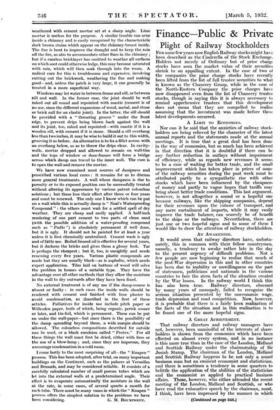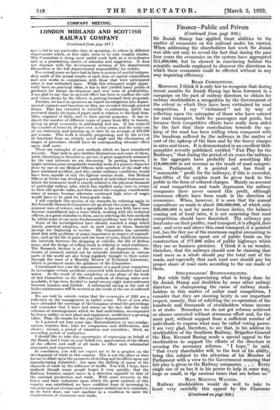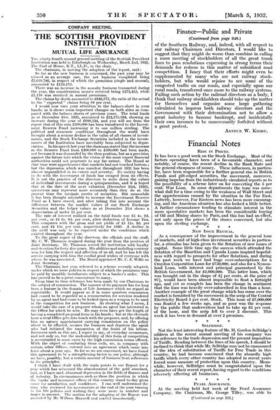Finance—Public & Private
Plight of Railway Stockholders
Foss some few years now English Railway stocks might have been described as the Cinderella of the Stock Exchange. Holders not merely of Ordinary but of prior charge stocks have seen the market value of their securities shrink to an appalling extent. In the case of two of the companies the prior charge stocks have recently been lifted from the list of full trustee securities to what is known as the Chancery Group, while in the case of the North-Eastern Company the prior charges have now disappeared even from the list of Chancery trustee stocks, though in saying this it is always necessary to remind- apprehensive trustees that this development does not mean that they are compelled to realize assuming that the investment was made before these latest developments occurred.
A LIMIT TO ECONOMIES.
Nor can it be said that the anxieties of railway stock- holders are being relieved by the character of the latest annual reports and the statements made at the annual meetings. It is true that a great deal has been done in the way of economies, but so much has been achieved in that direction that it is doubtful if there can be any further reduction in outlays without impairment of efficiency, while as regards new revenues it seems to be a case of waiting for better trade, and the small improvement which has taken place in prices of some of the railway securities during the past week must be attributed partly to a sympathetic rise with other stocks which have been influenced by the cheapness of money and partly to vague hopes that tariffs may bring about better trade conditions. This last argument, however, is not altogether a sound or a hopeful one because railways, like the shipping companies, depend for their revenues upon the volume of transport, and any mere curtailment of imports, while it may easily improve the trade balance, can scarcely be of benefit to the ships or the railways. Nevertheless, there are just one or two hopeful signs and to some of these I would like to draw the attention of railway stockholders.
AN AWAKENING.
It would seem that railway directors have, unfortu- nately, this in common with their fellow countrymen, namely, a tendency to awake rather late in the day to the present urgency of difficult problems. Not a few people are now beginning to realize that much of the post-War depression in this and in other countries has been, due to inability or unwillingness on the cart of statesmen, politicians and nationals in the various countries to face the stern facts of the situation created by the War losses. In the railway world I think this has also been -true. Railway directors, obsessed by many years of monopoly, failed to recognize the serious situation presented by the uneconomic wage, trade depression and road competition. Now, however, it is probable that there is a fairly keen realization of the facts of the situation and in this realization is to be found one of the more hopeful signs.
A GREAT ACHIEVEMENT.
That railway directors and railway managers have not, however, been unmindful of the interests of share- holders is shown from the economies which have been effected on almost every system, and in no instance is this more true than in the case of the London, Midland and Scottish Railway under the chairmsnship of Sir Josiah Stamp. The chairman of the London, Midland and Scottish Railway happens to be not only a sound business man but an eminent economist and statistician, and there is sometimes a tendency in some quarters to belittle the application of the abilities of the statistician and the economist as applied to practical business affairs. Those, however, who either attended the recent meeting of the London, Midland and Scottish, or who have read the exhaustive speech by the chairman, must,
think, have been impressed by the manner in which
(Continued oft page 348.) Finance—Public and Private (Continued from page 846.) Sir Josiah Stamp has s applied these :abilities to the matter of. economies on the railroad under his control. When addressing the shareholders last week Sir Josiah %ail able not only to reveal the fact that during the past four years the economies on the system have aggregated £11,000,000, but he showed in convincing fashion the scientific methods employed, to discover the directions in which these economies could be effected without in any way impairing efficiency.
ROAD COMPETITION.
Moreover, I think it is only fair to recognize that during recent months Sir Josiah Stamp has been foremost in a campaign on the part of railway directors to obtain for railway stockholders a recognition by the Government of the extent to 'which they have been victimized by road competition. I say " victimized " not by way of reflection upon the enterprise of those who have catered for road transport, both for passengers and goods, but because their competitive efforts have really been aided by the fact that their contribution towards the up- keep of the road has been trifling when compared with the handicap suffered by the railways in the matter of cost of the upkeep of the lines and by the heavy charges in rates and taxes. It is demonstrated in an excellent little 'pamphlet recently published, entitled Fair Play for the , Railways," that during the period of six years the railways in the aggregate have .probably lost something like E16,000,000 in net revenue as the result of road competi- tion. Parliament, it is pointed out, has fixed a " reasonable " profit for the railways; if this is exceeded, four-fifths of the surplus must be given back to the public in the form of reduced charges. Mainly on account of road competition and trade depression the railway companies have never earned this profit, although strenuous efforts have been made in the direction of economies. When, however, it is seen that the annual expenditure on roads is about £60,000,000, of which only 120,000,000 is met by motor licence duties, the balance coming out of local rates, it is not surprising that road competition should have flourished. The railways pay local rates on their profits; road transport, it is alleged, does not: and over and above this, road transport, it is pointed out, has the free use of the enormous capital amounting to hundreds of millions spent out of public funds on the construction of 177,000 miles of public highways -which they use SS business premises I think it IS no wonder, therefore, that the _railways should now be claiming that road users as a whole should pay the total cost of the roads, and especially that each road user should pay his proper share of road costs according to the use made of them.
• STOCKHOLDERS' RESPONSIBILITIES.
But while 'funk appreciating what is being done by Sir Josiah Stamp and doubtless by some other railway directors in championing the cause of railway stock- holders in this matter of unfair road competition, I consider that they are showing laxity in one important respect, namely, that of soliciting the co-operation of the hundreds and thousands of stockholders whose income is at stake. Nowadays we do not get reforms achieved or abuses corrected without strenuous effort and, for the most part, without support from a sufficient number of individuals to express what may be called voting power.
am very glad, therefore, to see that, in his address to stockholders of the Southern Railway, Brigadier-General the Hon. Everard Baring made a special appeal to the stockholders to support the efforts of the directors in securing the necessary reforms. " I hope,". he said, "that every shareholder will, to the best of his ability, bring this subject to the attention of -'his Member of Parliament with a view to the Government ensuring that fair play is given to the Railway coinpanies. . . . EN,ery single one of us has it in his power to help in some way, large or small, in tlje anxious times that are before us."
MASS MEETING WANTED.
Railway, stockholders would do well to take to heart very carefully this appeal by the Chairman (Continued on page. 856) Finance—Public and Private (Continued from page 848.)
of the Southern Railway, and, indeed, with all respect to our railway Chairmen and Directors, I would like to suggest that they might do worse than combine in calling a mass meeting of stockholders of all the great trunk lines to pass resolutions expressing in strong terms their demands for redress in this matter of subsidized road competition. I fancy that their efforts might even be supplemented by many who are not railway stock- . holders, but who would rejoice to see some of the congested traffic on our roads, and especially upon our rural roads, transferred once more to the railway systems. Failing such action by the railroad directors as a body, I think that railway stockholders should take up the Matter for themselves and organize some large gathering calculated to impress both railway directors and the Government with their determination not to allow a great industry to become bankrupt, and incidentally their own incomes to be unnecessarily forfeited without a great protest. ARTHUR W. KIDDY.




















































 Previous page
Previous page